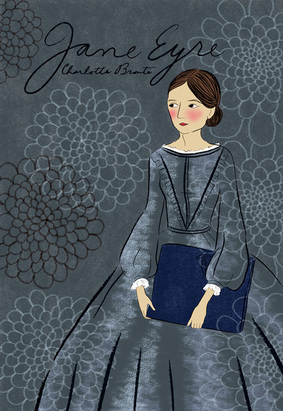Review of Charlotte Bronte's Jane Eyre, by Cindy Morson  Every reader finds a hero or heroine that embodies virtues and characteristics we value. We want to be like them, without being them. We want to be tough, courageous, witty, resolute, and overcome challenges with grace like them, but leave the poverty, hunger, war, betrayal, and destitution on the pages of their creator’s imagination. Heroines like Scarlet O’Hara, Lizzie Bennett, Lisbeth Salander, Katniss Everdeen, Hemione Granger were made more famous on the big screen, but it is the books that allow you to connect more intimately with what makes them tick. The inner thoughts and soliloquys of their struggles, allow the reader to empathize, to say, “I know how you feel,” or to take courage when they say or do something we may think we could never do, but always wanted to. Personally, I love the classics, and I’ve re-discovered a favourite heroine in Jane Eyre. She kicks some noble asses, right off their shiny steeds. I read this book years ago, but it crossed my path (as a free give-away - yes, please!) and it had me ignoring meals and walking into walls as I turned pages, all over again. The language is so beautifully descriptive and poetic, I felt myself in the scene, wearing a grey silk frock, reading by the coal lit fire. As an orphan with a loveless benefactress and cruel playmates, Jane tries to mold her character into a pleasing shape to receive the love any child would naturally crave in a household. She tries to change her true self a couple of times throughout the story to please others, but soon realizes that by doing so, the result is despair and further heartache. She finds role models and friendships in the boarding school she is sent to, where her strong principles and unyielding determination find roots. Then, Mr. Rochester enters the scene (dun dun duuuun!). Having read it once before, I was anticipating his appearance, like a school girl waiting for her crush to sit down next to her. (Don’t judge me). He’s no Johnny Depp, Ryan Reynolds, or whoever handsome creature floats your boat. His mannerism is even quite brash, and, as Jane often describes, “brooding.” But Jane, having been told many times that she is no goddess, is not one to value outer beauty over inner; and because we want to be like her, neither do we. Plus, we want our heroine to have the love she has lacked, and because Mr. Rochester provides love whole-heartedly to her, we adore him for it. However, to me, this isn’t a love story, and that is far from the end. Charlotte Bronte provides a biography of the fictional Jane Eyre, much like Charles Dickens provides a life story of Oliver Twist: with a tragic turned noble character that overcomes all odds by sticking to her values and being rewarded with positive karma (especially when all seems impossible and destitute), and finding contentment. The reader loves her tenacity. Her principles are tested often and the more she passes the challenges, the more her values become cemented in her heart. We learn from Jane that to be anything other than our true self, to be “forced to keep the fire of [our] nature continually low, to compel it to burn inwardly and never utter a cry, though the imprisoned flame consumed vital after vital – this would be unendurable.” Thanks, Jane, for reminding us.
0 Comments
Your comment will be posted after it is approved.
Leave a Reply. |
NOWW Writers
Welcome to our NOWW Blog, made up of a collection of stories, reviews and articles written by our NOWW Members. |
Proudly powered by Weebly

 RSS Feed
RSS Feed